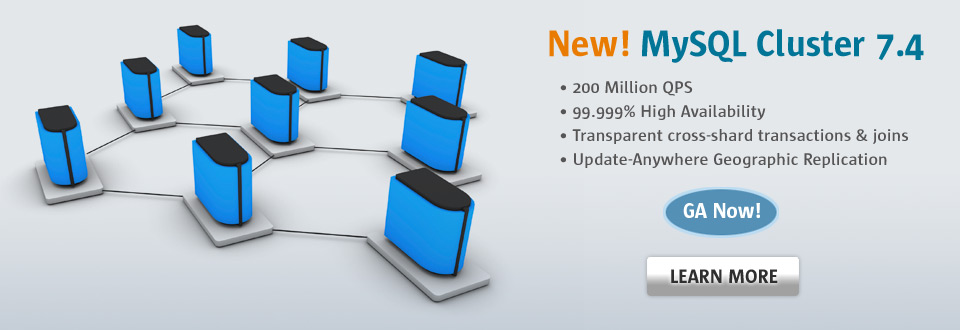 I recently hosted a webinar introducing MySQL Cluster and then looking into what’s new in the latest version (MySQL Cluster 7.4) in some more detail. The replay of the MySQL Cluster 7.4 webinar is now available here. Alternatively if just want to skim through the charts then scroll down.
I recently hosted a webinar introducing MySQL Cluster and then looking into what’s new in the latest version (MySQL Cluster 7.4) in some more detail. The replay of the MySQL Cluster 7.4 webinar is now available here. Alternatively if just want to skim through the charts then scroll down.
Abstract
MySQL Cluster powers the subscriber databases of major communication services providers as well as next generation web, cloud, social and mobile applications. It is designed to deliver:
- Real-time, in-memory performance for both OLTP and analytics workloads
- Linear scale-out for both reads and writes
- 99.999% High Availability
- Transparent, cross-shard transactions and joins
- Update-Anywhere Geographic replication
- SQL or native NoSQL APIs
- All that while still providing full ACID transactions.
Understand some of the highlights of MySQL Cluster 7.4:
- 200 Million queries per minute
- Active-Active geographic replication with conflict detection and resolution
- 5x faster on-line maintenance activities
- Enhanced reporting for memory and database operations
Charts
Questions and Answers
- Can all data be stored on disk rather than in memory? Any column that isn’t part of an index can be stored on disk if you want it to be. There is then an in-memory cache for the disk-based data.
- Is in-memory data safe from the whole system shutting down (e.g. power loss for the whole data center)? The in-memory data is (asynchronously) checkpointed to disk (so that there is persistence but latency isn’t impacted).
- I need to store more than 14K non BLOB/TEXT data in a single row – has this been addressed? As you say the options are to use TEXT/BLOB columns (or of course to split the data over multiple rows).
- Can you comment on improvements of virtualized deploymets regarding the 7.4 version? Only to say that more and more people are deploying on VMs and we’re not seeing issues caused – if we do then they’ll be fixed
- Can I upgrage from the previous version (7.3) to MySQL Cluster 7.4 or do I have to reinstall the product of the new version (7.4)? You can perform a rolling upgarade from MySQL Cluster 7.3 to MySQL Cluster 7.4 – the database stays uo throughout the process and you don’t lose any data or have to stop writing changes.